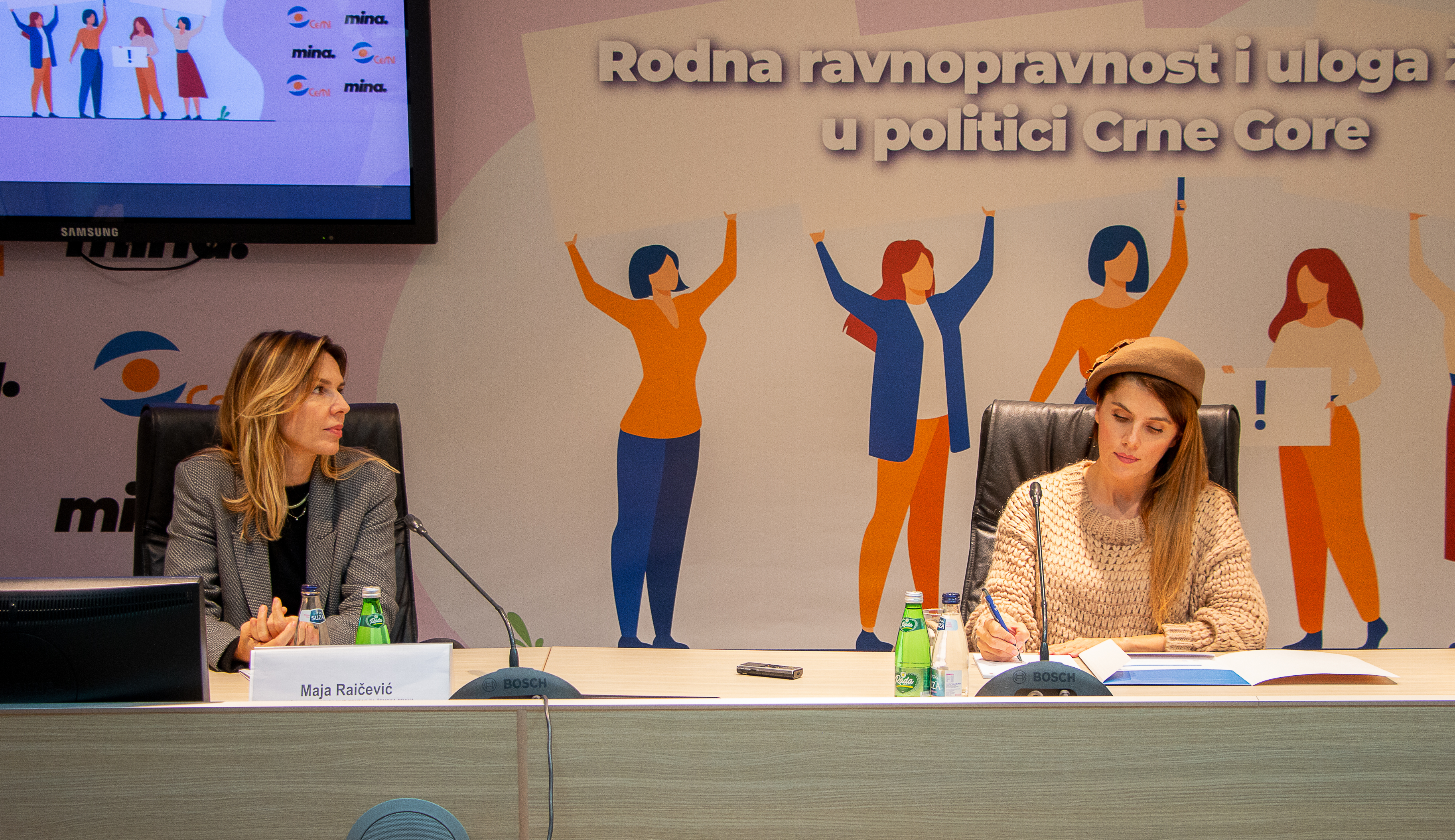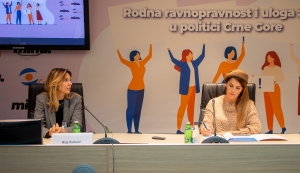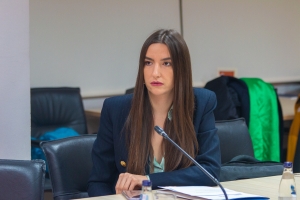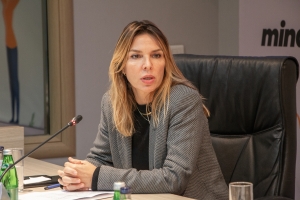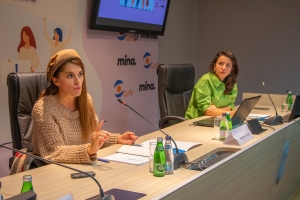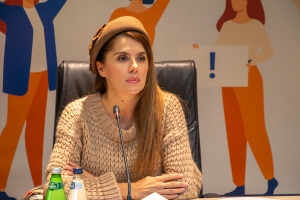In Montenegro, in addition to informal obstacles for the participation of women in politics, there are also those of a systemic nature, said the executive director of the Center for Women's Rights, Maja Raičević.
At the panel discussion entitled Gender equality and the role of women in the politics of Montenegro, which was organized by the Centre for Monitoring and Research and the MINA agency, she said that women's voices are not heard enough.
"Even when there is one, that voice is often separated by some patriarchal patterns and topics that are imposed, which we still witness today," said Raičević.
According to her, patriarchal politics, for which the party leaders are responsible, causes enormous damage to the entire society.
"In addition to informal obstacles to women's political participation, such as issues of attitudes, prejudices, and upbringing, we have real obstacles to women's political participation that are of a systematic nature," Raičević said.
She stated that the laws that guarantee and were passed to increase the possibility of women to actively participate in political life are not respected.
Raičević pointed to the research conducted by the Center for Women's Rights in 2000 and in which they dealt with how women vote.
"It turned out that a large number of women vote the way their male family members decide, and there were also situations when they were not allowed to talk to us," said Raičević.
She said that the situation has changed and that today there are more women in politics, with a very clear attitude.
"I want to give support to all those women in politics who think autonomously and are ready to unite and be in solidarity," Raičević pointed out.
She said that she is not surprised that women are reluctant to enter politics, because it is perceived as "dirty" work.
"We had an escalation of hate speech, I think that this greatly influenced not only women withdrawing from politics, but also from the public space," Raičević said.
She said that she thinks that many women very often decide not to participate in public life in order to preserve personal and family peace.
"Hats off to all the women who decided to engage in politics and persevere in their autonomy and clearly expressed attitude," emphasized Raičević.
She said that it would be ideal if quotas were not needed in Montenegro, if there were enough women in politics and electoral lists.
Raičević said that during the last local elections in Montenegro, illegal electoral lists were approved that did not meet the requirement that at least 30 percent of women be on them.
She stated that we continuously have this phenomenon in local elections.
"We also have the phenomenon that the parties do not allocate the money they receive from the Ministry of Finance for their women's organizations." That is also a serious problem," Raičević added.
She said that it is a question of the rule of law and that the state must be ready to stand up for the protection of the laws it has passed, which refer to the possibility of women to participate in political life.
Asked to comment on the shifts to the right across Europe and the fact that parties of the center are losing support in some countries, Raičević said that in Europe women are now turning to right-wing parties much more than before.
That, as she stated, should worry all civic and left-wing actors and make them wonder why this is happening.
Raičević pointed to a study from 2016, which showed that women aged 18 to 40 are most concerned about equal pay, equal opportunities in professional life and quality conditions for childcare.
She said that it is not unusual for women to turn more to those programs that offer them some financial security and that can help them take better care of their children, although this is apparently and most often populism.
Right-wing parties, as Raičević said, are extremely populist in their policies regarding social protection and increasing the birth rate.
When asked if Montenegro is ready for a female leader, she said that the real question is what kind of leader we are ready for.
"Although I stand for women's rights to equal political participation, I certainly don't want it to be someone like Giorgia Meloni. "I would prefer it to be someone like the Prime Minister of New Zealand," Raičević said.
The MP of the Democratic Party of Socialists, Aleksandra Vuković, agrees that the voice of women in Montenegro is not heard enough.
She said that there are not many women in positions of power or decision-making in Montenegro.
"That's a problem I've been emphasizing all the time, which is that women haven't succeeded in breaking the so-called glass ceilings," said Vuković.
According to her, where there is real power, there are no women there, both in Montenegro and in the region.
"Statistics constantly show that where there is so-called soft power, women are elected, and where there is real, bureaucratic power, men are elected," stated Vuković, adding that men are given the space to be at the head of the Assembly, the state, and the Government.
She said that regardless of the fact that in Montenegro a woman happens to be at the head of the parliament, it is usually a risky, crisis time where her position is forced.
According to Vuković, the situation for women in politics is unfavorable.
"Of course, the position of women in all other spheres follows from that." That's what I can't come to terms with. Obviously, we have come to a situation where it takes courage for a woman to be involved in politics, no matter what kind of work that is risky, that causes attention, public comments, and criticism," said Vuković.
She pointed out that in some moments of crisis, women showed more determination than men.
Vuković reminded that in the local elections there were lists on which there were not enough women.
"That is unacceptable, and I don't know how those lists could have been approved considering that there are clear legal frameworks and that it is known how to go to the elections," emphasized Vuković.
She believes that parties can do much more to motivate women to engage in politics, especially civil politics.
Vuković said that, unfortunately, numerous parties in Montenegro do not have women's organizations.
When asked how the strengthening of the right-wing and conservative parties in Europe affects the position of women, she said that nationalism and right-wingism are primarily populist in nature.
"And then when the elections are won, on the wave of such rhetoric, those people in the Western democracies still retreat a little, because they are Western democracies after all," said Vuković.
Speaking about the influence of the church, she said that "the influence of the church that we have today in politics also leads to the difficult position of women in Montenegro."
She asked how it is that by strengthening the influence of the church in political life, we have a strengthening of misogyny and sexism.
"Well, of course, because it strengthens the right, that is, rage, a male-centric closed circle that wants to reduce everything to its measure of defending so-called traditional values, both in politics and in other spheres," said Vuković.
That, as she said, is a big problem.
"If there is no clarification of this political situation and removal in relation to the influence of the church, my vision of Montenegro is not good at all." I know what the church is in our framework, in the framework of Montenegro and the Western Balkans," Vuković added.
In response to the question of whether Montenegro is ready to have a female leader, she said that she believes that it should be a woman who has education, modesty, conscientiousness, and morals to resist corruption and all the evils that have been happening in society.
Milena Gvozdenović, representative of the Center for Democratic Transition, said that in the last local elections, a quarter of the total number of electoral lists was declared illegal, despite the fact that there were not enough women on them.
As she stated, more or less all parties participated in this.
"The lists were returned because there are not enough signatures of support, there are not enough candidates for councilors, but not because there are not enough women on them," Gvozdenović said.
Suada Musić from the Bosniak Party said that the emphasis should be placed on the empowerment of women.
She pointed out the importance of support and solidarity among women.
